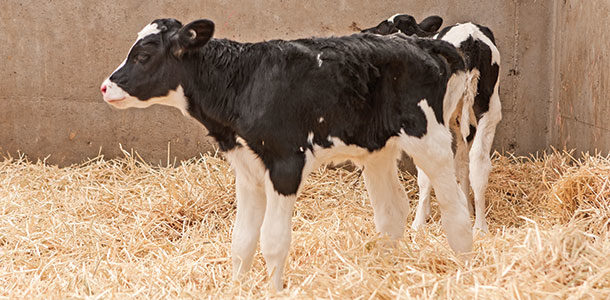As any producer knows, a healthy calf grows into a healthy heifer. Healthy heifers will have fewer problems and are more likely to reach their genetic potential. Every little bit counts when it comes to keeping calves healthy. One way some producers are giving their calves an extra edge is by feeding them whole-egg antibodies for the first three weeks of their life.
According to Dr. Hellen Greenblatt, who is consulting with Trouw Nutrition USA, egg antibodies are found both in the egg yolk and white. IgY antibodies are found solely in the yolk; hence the name “IgY.” The egg white is just as important as the yolk because it contains other components, such as IgA and IgM.
When a hen is exposed to pathogens, she produces specific antibodies against those pathogens. These antibodies are deposited into the egg to protect the chick from disease. This is similar to the dam depositing IgGs into her colostrum. However, unlike the dam, the hen only has one chance to pass this protection on to her young, so she has to make it count.
Egg antibody supplements are more specific than colostrum in what they can help protect the calf against. If the calf’s dam has not been exposed to a specific pathogen, she cannot provide that protection to her calf.
Her colostrum is rich in immunoglobulins (antibodies) produced against the pathogens to which she has been exposed. It is for this reason Greenblatt says egg antibodies should be used as an enhancement to a calf program.
The colostrum provides the calf with antibodies to help protect against pathogens the dam has been exposed to over her lifetime. A whole-egg supplement provides the calf with antibodies to help protect against common calf diseases such as E. coli or rotavirus – to which the dam may or may not have been exposed.
When a calf initially receives colostrum, not all of the antibodies are absorbed through the gut wall. Some of them stay in the intestine to help prevent pathogens from attaching and potentially causing disease. Egg antibodies are similar to mammalian (colostral) antibodies.
However, they only line the gut and are not absorbed into the bloodstream. This not only enhances the initial barrier set up by the colostral antibodies but extends it long after it would normally disappear since calves are generally not fed colostrum after the first 24 hours.
In addition, egg antibodies attach more firmly to pathogens than mammalian antibodies, making them superior at keeping harmful pathogens out of the calf’s system.
Curt Beyer, a technical and product manager at Trouw, recommends that calves start receiving the supplement with their first meal. Calves should be fed 2 grams twice a day for a total of 4 grams per day for the first three weeks of life as standard practice. Some producers may feed additional egg antibodies depending on problems associated with their farm.
According to Beyer, producers will typically spend $0.16 to $0.20 per day for each calf, which amounts to $3 to $5 per calf if egg antibodies are fed for three weeks. This will depend on the amount fed and the brand they use. Beyer says the producers he has worked with who feed their calves egg antibodies report their calves are healthier and thriftier as a result.
Egg antibodies are nothing new. In fact, Greenblatt says whole raw eggs have been used since the ancient Romans to aid healing of soldiers’ wounds. Egg antibodies are not a drug-based product; they are immunoglobulin-based. As a result, egg antibody supplements can be used as a preventative measure with few concerns.
According to Greenblatt, egg antibody supplements do not irritate or inflame the gut like mammalian antibodies sometimes do. This is because the structure of IgY antibodies differs from IgG antibodies.
Egg antibodies are also more concentrated since the hen must pack all of the necessary antibodies into one tiny egg instead of being spread throughout multiple quarts of colostrum. Egg antibodies are a supplement and should not replace the first feeding of colostrum.
Calves are the future of the dairy. Producers only have one chance to raise them right. Every preventative measure taken against disease keeps calves healthy, enhances their growth and development and results in more high-quality milking cows that reach their full genetic potential. PD
The information in this article was provided by Curt Beyer and Dr. Hellen Greenblatt with Trouw Nutrition USA. Beyer is the Protimax technical and product manager at Trouw. Greenblatt is consulting with Trouw. She holds a Ph.D. in microbiology and immunology and is a member of the New York Academy of Sciences. She has published widely in the field and has numerous patents, many of which focus on the use of whole-egg antibodies for digestive and immune health.
Photo by Mike Dixon.

Jenna Hurty
Editor
Progressive Dairyman









